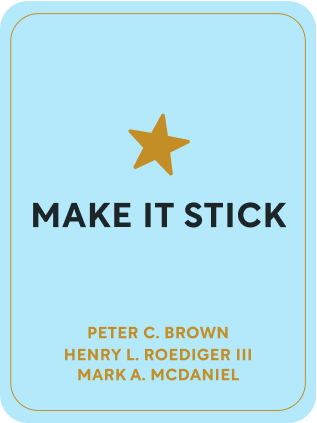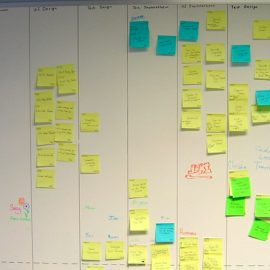

This article is an excerpt from the Shortform book guide to "Make It Stick" by Peter C. Brown, Henry L. Roediger III, Mark A. McDaniel. Shortform has the world's best summaries and analyses of books you should be reading.
Like this article? Sign up for a free trial here .
What’s the best way to practice memory retention? How do you improve the accuracy and the speed with which you recall information?
The most effective way to improve learning retention is through retrieval practice. Retrieval is any exercise that requires you to recall the information or skill you’ve learned. Retrieval practice can take the form of a classroom quiz, self-testing with flashcards, and making up your own questions about key concepts to test yourself later.
Learn more about how to improve learning retention using retrieval practice.
Retrieval Practice
Think of learning like stringing beads for a necklace: Every new fact, concept, and skill is a bead, and your memory is the string. The beads will simply slide off the other end of the string if you don’t tie a knot to keep them in place. Retrieval is the knot at the end of the string that prevents you from forgetting what you learn. When you repeatedly practice retrieval, you’re double- and triple-knotting the string to make sure the beads don’t slip off.
The better you remember something, the more reflexively you can recall that information when you need it, which is a key aspect of mastery. For example, a quarterback practices movements and scenarios until they become second nature—because when it’s game time, he won’t have a spare second to stop and think about what he has to do.
Before we explain how to improve learning retention using retrieval practice, let’s go over the problems with the strategies most people use: rereading and massed practice.
Why Rereading and Massed Practice Don’t Work
You have a test or presentation in a few days. You have pages of notes you need to burn into your memory. What do you do?
If you’re like most people, you read the material—and then read it again, and again, perhaps highlighting and annotating along the way.
Most people believe that rereading and massed practice (practicing one thing over and over in one sitting) are the most effective ways to learn and remember information. However, single-subject focus and endless repetition present three problems:
1) They take a lot of time. The time you spend rereading would be better spent using other, more effective strategies, which we’ll get into later.
2) They don’t help you remember the information long term. You may remember the material long enough to pass a test the following day, but you’ll forget most of it by the time the midterm rolls around. In fact, research proves that retention quickly fades with these methods.
In a pair of identical experiments conducted at two different universities, one group of participants read the material once, and another group read it twice in one sitting. When both groups were tested right after reading, the group that read the material twice did slightly better. However, when the groups were tested later, there was no difference—the benefit of rereading was only temporary.
3) They fool you into thinking you’ve mastered the material. Rereading in succession makes you more familiar with the specific text and its wording, which tricks you into thinking you’ve mastered the concepts behind the text. Mastery requires you to know the information, grasp the underlying ideas and concepts, and understand how to apply them to different situations.
You may have understood a concept as it’s described in a lecture or a textbook, but can you explain it to someone else in your own words? Can you come up with another example of it? Can you apply it to another context? Rereading alone doesn’t illuminate where your gaps in understanding are.
Now, let’s explore how to improve memory retention through retrieval practice.
Principle 1: More Difficult Retrieval Leads to Better Retention
There is a myth among some educators that learning and studying are more effective when they’re presented in ways that are easy and enjoyable. If students are engaged and having fun, they must also be learning, right?
On the contrary, the harder your brain has to work to retrieve the information, the better it cements it in your memory. You can make retrieval more challenging in two ways:
- By using generation, or generative learning, which requires you to generate the answer. Flashcards, short-answer questions, and essay prompts use generation, as opposed to true/false and multiple-choice questions, which offer possible answers.
- By delaying the retrieval practice, which forces your brain to work harder to remember the material. The delay should be long enough that your memory has gotten a little fuzzy, but not so long that you have to relearn the material. The longer you wait before the first test, the more you’ll forget in the interim. However, research shows that the rate of forgetting slows significantly after the first retrieval practice.
In one study, participants remembered pairs of words better when they had to use generation and first figure out one of the words in each pair and fill in missing letters. For example, participants were given the clue “foot-s__e” and had to determine that it should be “foot-shoe.” Although the exercise was fairly simple, the additional effort of having to fill in the blanks—as opposed to simply reading the pairs—improved participants’ retention.
Additionally, when participants were tested later, their memory was better if they were first exposed to a word pair and then had to fill in 20 other word pairs before doing their first retrieval practice. Again, the slight delay made the initial retrieval a little harder, and that effort improved retention.
Use Generation for Learning as Well as Retrieval
When you’re first learning a concept, use generation by attempting to solve a problem before you know how. Even if you come up with the wrong answer, you’ll gain a deeper understanding and better retention of the solution when you learn it.
There are two aspects to this:
- As you try to figure out the answer, you search your brain for prior knowledge that might help lead you to it. For example, if you’re trying to figure out the capital of Texas, you start by listing the Texas cities you know and anything you know about them. When you do learn the correct answer, your prior knowledge is already pulled up and primed to make connections with this new information, which is a critical aspect of learning and retention.
- When you fail to come up with the right answer to a problem, you pay more attention to the solution when you learn it.
Principle 2: Frequent Testing Improves Retention
In addition to the difficulty, the timing of your retrieval practice also impacts its effectiveness. The most effective approach is to test soon after you’re exposed to the material—after a slight delay, as we discussed in Principle 1—and then follow up with additional tests at various intervals.
After the first test, the longer you continue to practice retrieval at spaced-out intervals, the longer-lasting your retention will be. Additionally, regular testing deepens your level of understanding, which improves your ability to apply the knowledge in different contexts.
One study had students listen to a story and then try to recall the 60 objects that were mentioned in the story. Retention among different groups of students shows the impact of immediate and frequent retrieval:
- Students tested right after hearing the story remembered 53% of the objects, and they could still remember 39% a week later.
- Students who weren’t tested immediately only remembered 28% of the objects a week later.
- Students who were tested three different times within the first week remembered 53% of the objects a week later. (Shortform note: The book doesn’t specify at what intervals they took the three tests.)
We’ll talk more about spaced practice in the next chapter.
Principle 3: Corrective Feedback Aids Retention
Challenging yourself during retrieval strengthens your retention, but some mistakes are inevitable. Corrective feedback is crucial because it prevents students from remembering the wrong answer and reinforces the correct information.
Furthermore, when corrective feedback is slightly delayed, it leads to better retention than immediate feedback. Think of immediate feedback like learning to ride a bike with training wheels: You’re corrected automatically and begin to rely on that support, inhibiting your true learning and mastery of the material.
Strategy #1: Use Reflection to Improve Performance and Retention
Now that you know the principles of retrieval practice, how can you apply them? One way is through reflection.
You can reflect on a lesson from class by looking at your notes or the text and using a strategy called elaboration, in which you rephrase the main concepts and connect them with your existing knowledge and prior experiences. For example, if you’re reading a book about the history of Mexico, think about everything you already know about Mexico’s past and present and see how your knowledge connects with the information in the text.
Additionally, each real-world situation that requires you to use your knowledge and skills offers an opportunity to improve your performance and retention through reflection. After you have an experience that uses certain knowledge, think about:
- How you approached the situation
- How successful you were
- How you could improve next time
As you reflect, mentally rehearse how to apply your knowledge, which deepens its imprint in your mind.
Strategy #2: Use Retrieval in the Classroom With Regular Quizzes
Frequent tests and quizzes are another key element of retrieval practice. In a classroom setting, testing is often used and thought of as a measure of students’ retention, but it’s generally overlooked as a tool to aid retention. However, small changes can make a big impact on students’ learning.
Instead of having just a few big tests during a semester, students benefit from more frequent tests, such as unit tests and low-stakes quizzes. In addition to improving retention, the benefits of this approach include:
- Increasing students’ attendance, focus during lessons, and at-home studying because they know they have an impending test on the material.
- Decreasing students’ testing anxiety, because each test or quiz has a smaller impact on their overall grades than if their entire grades depended on just two big tests. (Shortform note: The book doesn’t cite this reason, but the regularity of testing may also make students more accustomed to and comfortable with testing.)
- Helping students gauge what they know and which topics they need to study more.
- Helping teachers gauge what students know and what material needs to be reviewed.

———End of Preview———
Like what you just read? Read the rest of the world's best book summary and analysis of Peter C. Brown, Henry L. Roediger III, Mark A. McDaniel's "Make It Stick" at Shortform .
Here's what you'll find in our full Make It Stick summary :
- How to understand and remember what you learn
- How a little forgetting helps you remember
- Why you’re not a good judge of how much you know






